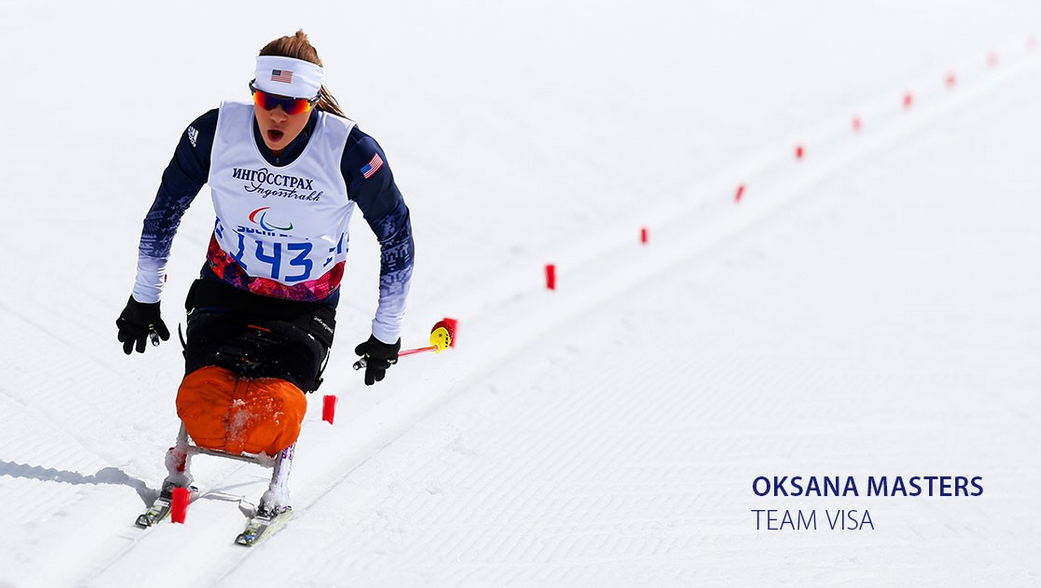Originally published in Visa.com
Visa, the first global sponsor of the International Paralympic Committee and sponsor of seven Paralympic Games since 2003, recently announced its continued global support of the IPC through 2020 and sponsorship of the Paralympic Winter Games PyeongChang 2018. This year, we welcomed more than 50 Olympic and Paralympic athletes to Team Visa, including Para cross-country skier and Para biathlete Oksana Masters (USA). Here is her remarkable story.
Rowing was Oksana Masters’s first love. “Water was super therapeutic for me. It was healing my body in so many ways,” said the three-time Paralympian. Born in Soviet-era Ukraine, just three years after the Chernobyl nuclear power plant disaster, Masters suffered several radiation-induced birth complications, including webbed fingers, deformed legs, one kidney and only parts of her stomach.
After being given up for adoption by her birth parents, Masters would spend the next seven years in three orphanages with limited food or medical care. Gay Masters, a single woman from Buffalo, New York, learned about Masters during the Ukraine’s three-year-plus moratorium against international adoption, leading to a two-year wait to adopt her. Aware she was chosen, Masters held onto a photo of her mother, never doubting she would one day come for her. When Gay arrived in the middle of one cold night, Masters recalls saying: “’I know you, you’re my mom. I have your picture, see?” Masters adds with a smile: “My mom and I joke that I’m her wedding gift because she adopted me using money her parents had set aside for her wedding.’”
Masters arrived in Buffalo malnourished (by nearly eight, she weighed only 35 pounds) and in need of medical attention. She was diagnosed with tibial hemimelia, a condition characterized by legs of uneven lengths, and by age nine her left leg would need to be amputated. Still, as someone who sees only possibilities in obstacles, she remained positive and was walking with a prosthetic leg in short order. “Buffalo was my first home in America. I made really good friends there. I was ice skating and just very active.”
By the time Masters was 13, Gay earned a spot as assistant professor of speech pathology at the University of Louisville in Kentucky, which meant Masters had to endure yet another move—and another operation. Her right leg too would eventually need to be amputated and complications led to her losing her knee during the procedure, something she desperately hoped the surgeon could avoid. It took her five months and a revision surgery to heal the incision and get bilateral prostheses, but her drive and spirit never waned. She was up and walking around the hospital and climbing stairs on her first day with her new legs.
Rowing brought her a new sense of freedom. “You just feel like you’re ready to conquer the world—just the pull of the oars on the water and the resistance you can just…it’s like screaming your head into a pillow and releasing so much.” Memories of her past began to surface at the time, including losing a dear friend in one of the orphanages, and she sought help to manage the trauma.
In 2011, Masters met her rowing partner, with whom she competed in the London 2012 Paralympic Games, bringing home a bronze medal. Masters’s fame had catapulted.
She posed without her prosthetics for a major sports magazine, for which she received great praise. “Sport is what really helped me break through that mold of what people perceive as beautiful,” she told Visa. “There’s nothing more attractive or intriguing about a person than confidence. God, it would be so boring if every person looked the same,” she added.
A lower-back injury sidelined her rowing career, so Masters shifted her focus to cross-country skiing to satisfy her competitive edge. It didn’t come easily, but with intense training and the perseverance she’s now known for, Masters qualified for the Sochi 2014 Paralympic Winter Games, where she won both a silver and bronze medal in the 12 kilometer and 5-kilometer Para cross-country skiing events, respectively.
She added Para cycling to the mix in 2014 and after just a few months of training, the rower-turned-skier-turned-cyclist qualified for the 2014 and 2015 World Championship team for hand cycling, earning a bronze in 2015. Masters eventually made the U.S. Cycling Team for the Rio 2016 Paralympic Games.
“I wanted to be an athlete and I wanted to go to the Paralympic Games and be the best; I was told instantly no. ‘Your body is too small, you’re not an ideal athlete build, you just need to go a different route. Sports isn’t for you,” she said. She wanted nothing more than to prove the naysayers wrong. As a Para cross-country skier and Para biathlete, Masters now has her eyes set on the Paralympic Winter Games PyeongChang 2018 and is one of the newest members of Team Visa, a program made up of more than 50 Olympic and Paralympic hopefuls for PyeongChang 2018. “To have a partner like Visa behind you supporting your dreams and believing in you, it’s amazing. I hope that my first gold medal is with the support and help of Team Visa.”

